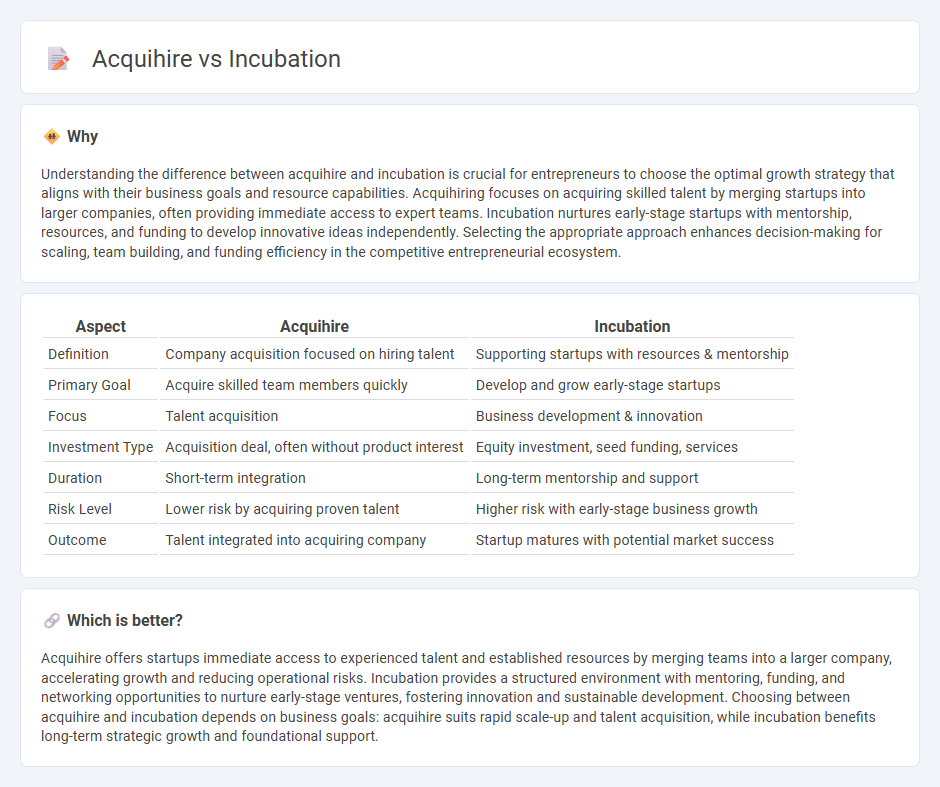
Acquihire involves acquiring a startup primarily for its talented team rather than its products or services, often accelerating access to skilled entrepreneurs and specialized knowledge. Incubation focuses on nurturing early-stage startups through resources, mentorship, and support to foster growth and innovation within a controlled environment. Explore more to understand which strategy aligns best with your entrepreneurial goals.
Why it is important
Understanding the difference between acquihire and incubation is crucial for entrepreneurs to choose the optimal growth strategy that aligns with their business goals and resource capabilities. Acquihiring focuses on acquiring skilled talent by merging startups into larger companies, often providing immediate access to expert teams. Incubation nurtures early-stage startups with mentorship, resources, and funding to develop innovative ideas independently. Selecting the appropriate approach enhances decision-making for scaling, team building, and funding efficiency in the competitive entrepreneurial ecosystem.
Comparison Table
| Aspect | Acquihire | Incubation |
|---|---|---|
| Definition | Company acquisition focused on hiring talent | Supporting startups with resources & mentorship |
| Primary Goal | Acquire skilled team members quickly | Develop and grow early-stage startups |
| Focus | Talent acquisition | Business development & innovation |
| Investment Type | Acquisition deal, often without product interest | Equity investment, seed funding, services |
| Duration | Short-term integration | Long-term mentorship and support |
| Risk Level | Lower risk by acquiring proven talent | Higher risk with early-stage business growth |
| Outcome | Talent integrated into acquiring company | Startup matures with potential market success |
Which is better?
Acquihire offers startups immediate access to experienced talent and established resources by merging teams into a larger company, accelerating growth and reducing operational risks. Incubation provides a structured environment with mentoring, funding, and networking opportunities to nurture early-stage ventures, fostering innovation and sustainable development. Choosing between acquihire and incubation depends on business goals: acquihire suits rapid scale-up and talent acquisition, while incubation benefits long-term strategic growth and foundational support.
Connection
Acquihire and incubation both serve as strategic pathways to foster innovation and talent within startups. Acquihires focus on acquiring skilled teams to enhance a company's capabilities, while incubators provide resources, mentorship, and support to develop early-stage ventures. Together, they accelerate entrepreneurial growth by blending talent acquisition with structured developmental frameworks.
Key Terms
**Incubation:**
Incubation involves nurturing early-stage startups by providing resources such as mentorship, funding, office space, and business support to accelerate their growth and product development. This process allows startups to maintain independence while benefiting from structured guidance designed to improve market fit and operational efficiency. Explore deeper insights into how incubation strategies foster innovation and scale new ventures effectively.
Startup Support
Incubation focuses on nurturing early-stage startups through resources like mentorship, office space, and networking to accelerate growth and product development. Acquihire emphasizes acquiring a startup primarily for its talented team rather than its products or services, often integrating employees into the acquiring company's operations. Explore how each approach can strategically support your startup's journey and growth opportunities.
Mentorship
Incubation emphasizes structured mentorship programs that nurture startups through access to industry experts, tailored guidance, and resources to accelerate growth. Acquihire focuses on integrating skilled talent by acquiring a company primarily for its experienced team, often providing mentorship within a corporate environment to align skills with organizational goals. Explore in-depth comparisons of mentorship approaches in incubation and acquihire to understand their strategic impacts.
Source and External Links
Incubation (psychology) - Wikipedia - Incubation in psychology refers to the unconscious processing of problems when they are set aside for a period, which can lead to insights and improved problem solving upon returning to the task.
Incubation - Definition, Meaning & Synonyms - Vocabulary.com - Incubation is a developmental process, originally meaning the egg warming period before hatching, and also refers to the time between infection and symptom onset in diseases.
Incubation (ritual) - Wikipedia - Incubation is a religious practice involving sleeping in a sacred place to receive divinely inspired dreams or cures, historically used in many ancient cultures and still practiced in some forms today.
 dowidth.com
dowidth.com